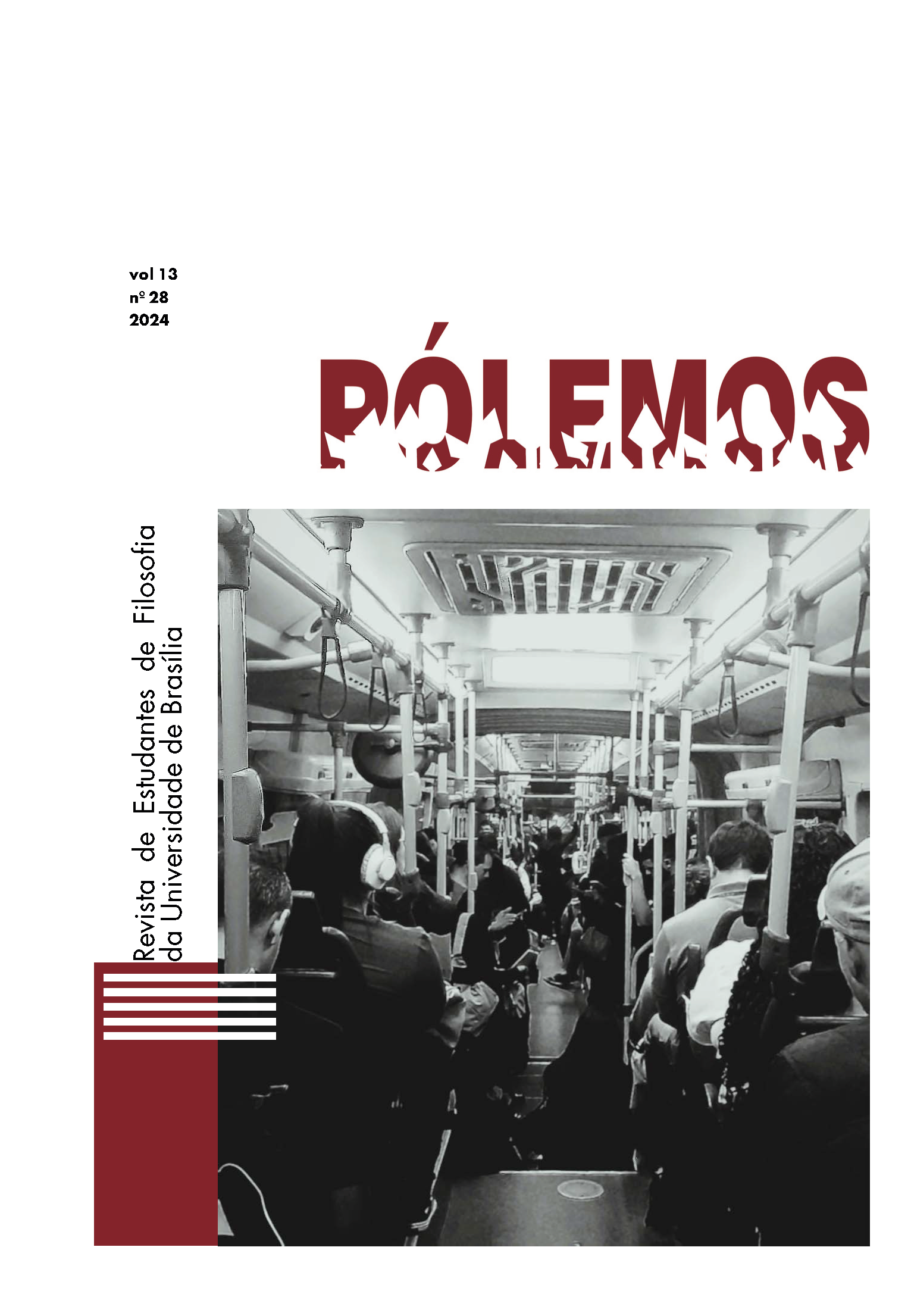ANCORANDO AS TEORIAS DO SIGNIFICADO CONTRA AS TEORIAS DE SIGNIFICADO CENTRADAS NA VERDADE
uma defesa de Dummett contra o programa de Davidson
DOI:
https://doi.org/10.26512/pl.v13i28.53848Palavras-chave:
Semântica de condições de verdade. Teoria do significado, Inferencialismo. Fundacionalismo sobre significado.Resumo
Micheal Dummett, em 1991(1993), propôs uma defesa contra uma teoria do significado baseada em condições de verdade, tomando inspiração nas teorias da prova, no intuicionismo e em uma concepção epistêmica anti-realista. Ele argumentou que abordagens baseadas na verdade falham em explicar fenômenos inferenciais que não são formalizados classicamente. Dummett enfatiza a necessidade de evitar assumir cegamente parâmetros fixos de sucesso com base na geração indutiva de significado através do conceito de "verdade". Em vez disso, ele sugere que a relação entre verdade e significado deve priorizar a concepção teórica do significado como o elemento mediador para ancorar estratégias de asserção bem-sucedidas. Neste artigo, utilizamos a teoria de Dummett para apresentar uma estrutura que desafia a teoria de Davidson. Argumentamos que a teoria de Davidson só possui valor científico-linguístico em condições ideais e otimizadas, onde o problema do intérprete já está circunscrito por uma representação não problemática da verdade. Essa estrutura exclui situações onde o próprio parâmetro da verdade se torna problemático, como conflitos entre hipóteses de tradução ou desacordos entre paradigmas científicos.
Downloads
Referências
BAGHRAMIAN, M. Davidson and Indeterminacy of Meaning. The Paideia Archive: Twentieth World Congress of Philosophy, v. 32, p. 1-7, 1998. DOI: https://doi.org/10.5840/wcp20-paideia199832530.
BODDY, R.; MAY, R. Frege On Reference. In: BIGGS, Stephen; GEIRSSON, Heimir (org.). The Routledge Handbook of Linguistic Reference. New York: Routledge, 2020, pp. 30-40. DOI: https://doi.org/10.4324/9781003111894-4.
BUTCHVAROV, P. On reference and sense. Journal of Philosophy, v. 79, n. 10, p. 551-553, 1982. DOI: https://doi.org/10.1515/9780748680801-073.
DAVIDSON, D. A coherence theory of truth and knowledge. In: LEPORE, E. (Ed.). Truth and Interpretation: Perspectives on the Philosophy of Donald Davidson. Oxford: Blackwell, 1986, pp. 307-319. DOI: https://doi.org/10.1093/0198237537.003.0010.
DAVIDSON, D. Inquiries into Truth and Interpretation. Oxford: Clarendon Press, 2001. DOI: https://doi.org/10.1093/0199246297.001.0001.
DUMMETT, M. The Logical Basis of Metaphysics. Cambridge: Harvard University Press, 1993. DOI: https://doi.org/10.5860/choice.29-1468.
DUMMETT, M. The Seas of Language. Oxford: Oxford University Press, 1996. DOI: https://doi.org/10.1093/0198236212.001.0001.
DUMMETT, M. Truth. Proceedings of the Aristotelian Society, v. 59, n. 1, p. 141-162, 1959. DOI: https://doi.org/10.1017/cbo9781139856003.004.
GAUDET, E. Quine's notion of fact of the matter. Dialectica, v. 60, n. 2, p. 181-193, 2006. DOI: https://doi.org/10.1111/j.1746-8361.2005.01049.x.
GENTZEN, G. Collected papers. Journal of Neurology, Neurosurgery & Psychiatry, v. s1-6, n. 23, p. 258-260, 1925. DOI: https://doi.org/10.1136/jnnp.s1-6.23.258.
KUHN, T. S. The Structure of Scientific Revolutions. 2. ed. Chicago: University of Chicago Press, 1970. DOI: 10.2307/2090620.
MOHAMMAD ALI, S. N. Breaking out of the Gricean vicious cycle: Let's divorce semantics and just agree that there is no meaning in language. International Journal of Language Studies, v. 16, n. 3, p. 33-60, 2022. DOI: https://doi.org/10.5281/zenodo.7514602.
MURZI, J. Classical Harmony and Separability. Erkenntnis, v. 85, n. 2, p. 391-415, 2020. DOI: https://doi.org/10.1007/s10670-018-0032-6.
POPPER, K. The Logic of Scientific Discovery. New York: Basic Books, 1959.
PRAWITZ, D. Classical versus intuitionistic logic: Why is this a proof? London: College Publications, 2015, pp. 15-32.
QUINE, W. V. O. Epistemology Naturalized. In: QUINE, W. V. O. Ontological Relativity and Other Essays. New York: Columbia University Press, 1969, pp. 69-90.
QUINE, W. V. O. Ontological Relativity and Other Essays. New York: Columbia University Press, 1969.
QUINE, W. V. O. Word and Object. Cambridge: M.I.T. Press, 1960.
SHANI, I. Intension and Representation: Quine's Indeterminacy Thesis Revisited. Philosophical Psychology, v. 18, n. 4, p. 399-418, 2005. DOI: https://doi.org/10.1080/09515080500229878.
TARSKI, A. Truth and proof. Scientific American, v. 220, n. 6, p. 63-77, 1969. DOI: https://doi.org/10.1038/scientificamerican0669-63.
TENNANT, N. Inferentialism, logicism, harmony, and a counterpoint. In: MILLER, A. (Ed.). Essays for Crispin Wright: Logic, Language and Mathematics. Oxford: Oxford University Press, 2008. DOI: https://doi.org/10.1093/oso/9780199278343.003.0009.
WILSON, D. Presuppositions and Non-Truth-Conditional Semantics. London: Academic Press, 1975. DOI: https://doi.org/10.1111/j.1468-0149.1977.tb01710.x.
WITTGENSTEIN, L. Philosophical Investigations. New York: Macmillan, 1953.
Downloads
Publicado
Como Citar
Edição
Seção
Licença
Copyright (c) 2024 PÓLEMOS – Revista de Estudantes de Filosofia da Universidade de Brasília

Este trabalho está licenciado sob uma licença Creative Commons Attribution-NonCommercial-NoDerivatives 4.0 International License.
Todos os trabalhos que forem aceitos para publicação, após o devido processo avaliativo, serão publicados sob uma licença Creative Commons, na modalidade Attribution-NonCommercial-NoDerivatives 4.0 International Public License (CC BY-NC-ND 4.0). Esta licença permite que qualquer pessoa copie e distribua a obra total e derivadas criadas a partir dela, desde que seja dado crédito (atribuição) ao autor / Ã autora / aos autores / às autoras.


